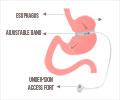Bariatric surgery with continuous-flow left ventricular assist device (LVAD) placement could significantly reduce BMI, allowing previously ineligible patients to undergo heart transplantation, reports a new study.

‘Many obese patients face barriers to get heart transplants, as recovery is considered more challenging and risky in people with high body mass. ’





"Despite being at higher risk for heart disease, when patients with obesity develop heart failure, their road to transplant can be frustrating," says cardiac surgeon and senior author of the study, Vakhtang Tchantchaleishvili, MD, assistant professor of surgery at Thomas Jefferson University. "Our study shows that weight reduction surgery can help patients both lose weight and qualify for a heart transplant for which they were previously not eligible due to excessive weight."
The study also aimed to compare two variations of the paired approach: LVAD surgery and bariatric surgery at the same time, versus a staged approach, where bariatric surgery was performed as a separate operation on average two years after LVAD. Researchers included a total of eight studies in the meta-analysis, making up a total of 58 patients who underwent dual-surgeries for LVAD and bariatric surgery. Of these 22 had simultaneous surgeries and 37 had staged.
"The goal of the study was really to see if these two surgeries could improve a patient's chance of eligibility for a heart transplant, which is the best long-term treatment for heart failure," says Dr. Tchantchaleishvili.
The researchers found that during the average follow-up of one year, 66% of these previously ineligible patients met the listing requirement for a heart transplant, and 33% got actually transplanted. Both simultaneous and staged approaches were comparable in terms of outcomes, including significantly reducing the body weight.
Advertisement
Source-Eurekalert















